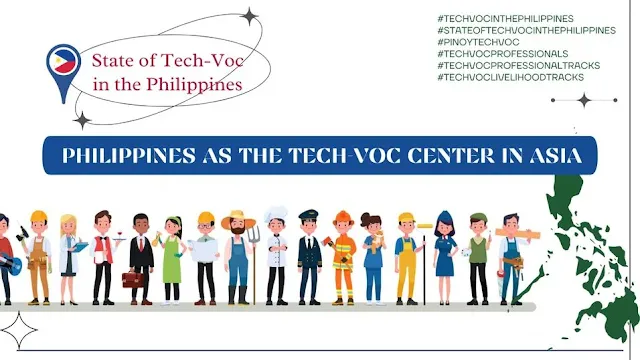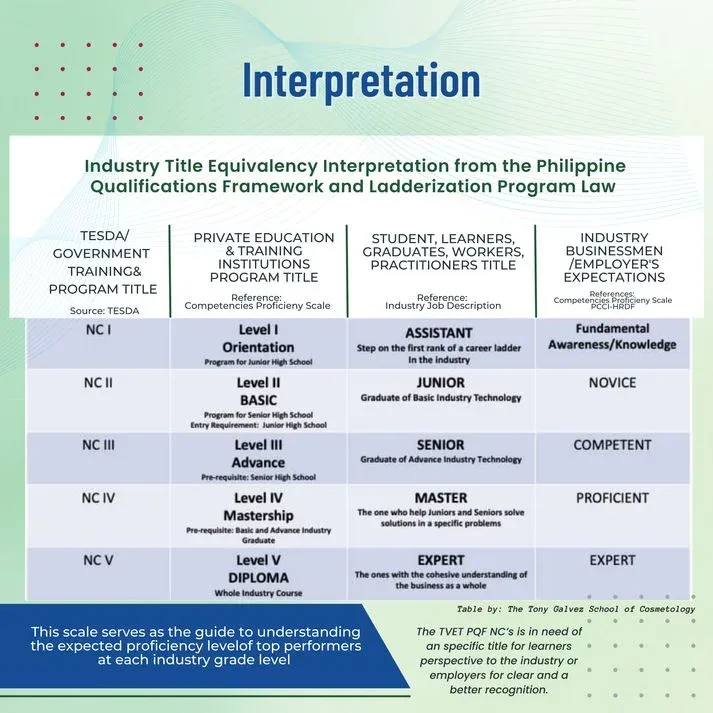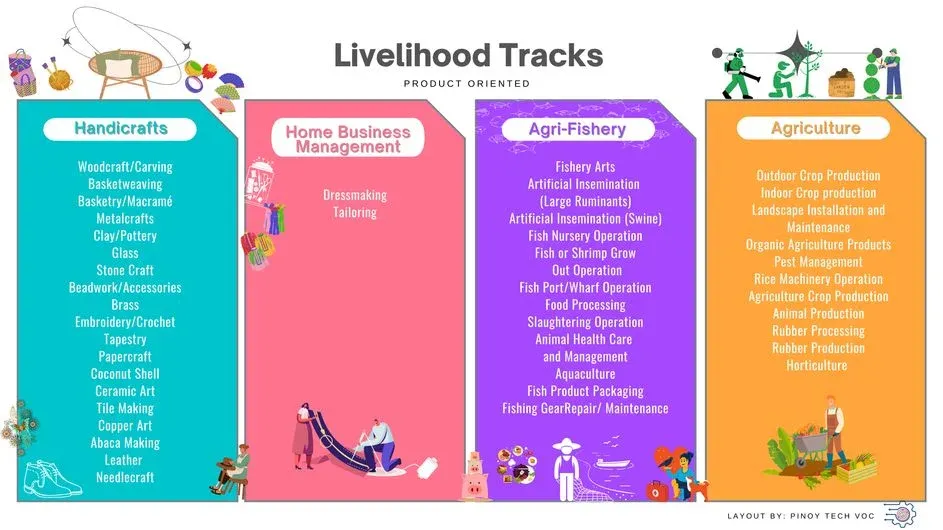The Philippines is one of the best in Asia in terms of academic education.
Proof of which is the number of local academic institutions that make it
into
international rankings
each year. In fact, local academic institutions attract a good number of
foreign students in their undergraduate and graduate programs alike. This is
a confirmation that Filipinos give utmost importance in getting a good education as a
ticket to more opportunities both here and abroad.

|
| Philippines as the Tech-Voc Center in Asia |
Shaping The Philippines As The Tech-Voc Center In Asia
The state of tech-voc in the Philippines
While the Philippines puts premium on academic education, the same doesn’t
hold true when it comes to technical education in the country where practical
and hands-on courses are still regarded by many as inferior to regular college
courses.
Just the same, there is a huge potential for the Philippines to become the
Technical-Vocational (Tech-Voc) center of Asia and also attract international
students to enroll in tech-voc courses.
Achieving that goal doesn’t happen in an instant. Even so, the national
government and its partners can start somewhere and continuously work their
way in regard to that objective.
Here’s where we can initially focus on:
1. Professionalize local tech-voc education
A good way to begin is to professionalize tech-voc education in the
Philippines. In fact, local private Technical-Vocational Education and
Training (TVET) institutions are pushing for the professional accreditation
and licensing of tech-voc education in the country.
Furthermore, there is also the need to ensure that tech-voc instructors have
the right set of skills and expertise to produce quality graduates. In doing
so, the Philippines will be able to prove its competitiveness in the area of
technical education to the rest of the world.

|
| Existing Philippine Qualification Framework and Ladderized Program Law |
Tony Galvez, an expert in the technical and vocational education in the
country, echoes its importance in shaping the future of many of our
countrymen. According to him, “Philippine TVET ang pag-asa para sa kinabukasan
ng mamamayan at ng bayan, kung maayos at maganda ang programa.”
Galvez is a strong advocate of professionalizing tech-voc in the Philippines
for it to achieve worldwide recognition.
“Magagawa nating umangat at umasenso ang pamumuhay ng ating mahihirap na
kababayan kung mabibigyan natin sila ng kahalagahan at maiaayos ang posisyon
ng technical vocational education and training ng bansa. Hindi lang ang
hangarin ay upang maging isang simpleng manggagawa. Kung hindi, tulungan natin
silang linangin bilang mga tunay na eksperto sa iba’t-ibang larangan ng
industriya upang ang lahat ay maging kapaki-pakinabang at mapabilang sa
pandaigdigang kompetisyon na makapagpapalago ng ating ekonomiya,” Galvez
added.
Moreover, another pivotal move to further professionalize tech-voc education
is to grant professional licenses to graduates. This would give successful
graduates the recognition that would elevate their status into a full-fledged
professional practitioner of their chosen skill and would give them sense of
pride and achievement.
Acquiring a license would give tech-voc graduates a right to demand a higher
salary and compensation for their services. And most of all, they can be at
par with the technical graduates of progressive countries.
The licensure exams will ensure that tech-voc graduates are allowed to
practice a profession which are deemed crucial to safety such as construction
and carpentry, cosmetology, and culinary arts among many other
service-oriented fields.
Doing so will hopefully open the eyes of our society that a four-year course
is the only avenue to attaining a decent lifestyle. The technical field is
expansive, uncharted, and not yet competitive, which thus holds new
opportunities as compared to the corporate world.
2. The need to regulate technical education in the country
Another important area that the Philippines needs to focus on to achieve
global recognition in tech-voc education is the need to implement regulatory
standards to ensure that TVET institutions produce only high caliber
graduates.
Tech-voc graduates all have essential roles to play in both local and
international industries. If they are well-skilled, they hold a vast potential
in contributing to the local economy.
One such industry that has a continuous requirement for skilled employees is
the services industry. There are plenty of opportunities that await tech-voc
graduates not just in the Philippines but in other countries as well.
3. Adopt best practices from successful countries
We can also learn a thing or two from our highly-industrialized neighbors such
as Japan, Singapore, and Korea. Aside from advancing academic excellence, they
also made great strides in technology innovation.
In additional to the knowledge gained from academic education, these countries
also teach their citizens to become productive, income-generating, and
contributors to the national coffers. Emphasis is given on the quality of
products and service which can only be achieved through proper technical
training. These countries believe in the strength of their manpower and their
role in the national economy.
4. Strengthen the tech-voc educational curriculum
Ayala Corporation CEO Jaime Augusto Zobel de Ayala, a staunch advocate for the
importance of technical skills in our society, once expressed that a
vocational or technical degree should be given a prominent position in our
country’s educational framework.
The curriculum should be wider and the accreditation status should be
significantly improved so that it will produce young graduates with specific
skills that match the market needs.
In the Philippines, the two main agencies tasked in providing basic education
in the country are the Department of Education (DepEd) for the academics and
the Technical Education and Skills Development Authority (TESDA), which is
mandated to provide direction, policies, programs and standards towards
quality technical education and skills development.
DepEd and TESDA’s roles should be complementary in that no roles should
overlap and create conflict in the implementation of their respective
programs. However, that is not the case as the deployment of the curriculum
from these two agencies have created some challenges for both of them,
specifically in relation to the K-12 curriculum.
With K-12, DepEd has borrowed some resources from TESDA because the tech-voc
curriculum should be handled by experts in the technical field and not by
regular teachers. This would-be effect of the K-12 curriculum was completely
unseen but it definitely needs to be resolved soon.
TESDA should be given complete responsibility by the government for technical
and vocational training, a separate agency from DOLE, DTI and DepEd. On the
other hand, TESDA also needs to go beyond just providing instructions and
training; it should also focus on thorough skills assessment in order to meet
globally-competitive criteria.
The tech-voc curriculum is envisioned to diverge into two tracks:
product-oriented and service-oriented.

|
| Livelihood tracks aim to provide skills training to its target beneficiaries, to engage them in livelihood projects that are income generating |
Product-oriented tracks are developed with the purpose of providing
income-generating projects to individuals such as stay-at-home moms,
out-of-school youths, seniors, retirees, and jobless folks, to name a few.

|
| Only by professionalizing all Service-Oriented Tech-Voc Courses will uplift the image of tech-voc students, graduates and practitioners in the country |
Meanwhile, the service-oriented sector includes housekeeping, culinary arts,
cosmetology, emergency medical service, automotive, construction services,
information technology, security services, executive assistantship,
photography, electronics, tourism, and healthcare services.
These are all professional tracks and require a high school diploma as a basic
requirement. Tech-voc service-oriented profession is not just a simple trade
because it requires highly specialized skills. All service-oriented tracks
will be identified by specific specialization based on the industry
qualification.
As of now, joblessness and lack of experts in vocational and technical skills are major concerns, but if TESDA is provided with more leeway in implementing its mandate, it can help address these issues faster and more efficiently.
Epilogue
In the end, the key to becoming globally competitive in tech-voc education is
to implement changes that focus on professionalizing it, strengthening the
curriculum, and solidifying the partnership between the government and private
institutions.
That would also lead to the creation of more jobs for Filipinos and encourage them
to seek opportunities locally rather than go abroad.
Of course, it’s easier said than done and it requires a lot of hard work. Just
the same, that doesn’t mean that it’s impossible to achieve in the future.
Tags:
lifestyle

